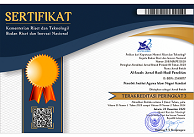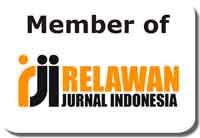Otoritas Istri Perspektif Akademisi Hadis: Analisis Resepsi Exegesis terhadap Hadis Rā‘iyah
Abstract
Keywords
Full Text:
PDFReferences
Abū Dāwud, Sulaimān bin al-Asy‘aṡ al-Sijistānī. Sunan Abī Dāwud. Edited by Muhammad Muḥy al-Dīn ‘Abd Al-Ḥamīd. Bairut: al-Maktabah al-‘Aṣriyah, 2009.
Aflaha, Umi. “Kajian Hadis dalam Ormas-Ormas Islam di Indonesia (Analisa Pemahaman NU Dan Muhammadiyah Terhadap Hadis-Hadis Misoginis).” Tesis, UIN Sunan Kalijaga, 2011.
Al-Bukhārī, Muhammad bin Ismā‘īl. Ṣaḥīḥ Al-Bukhārī. Edited by Muṣṭafā Daib Al-Bigā. V. Bairut: Dār Ibn Kaṡīr, Dār al-Yamāmah, 1993.
Denson, Razaana. “A Comparative Exposition of Islamic Law Relating to The Law of Husband and Wife.” Disertasi, Nelson Mandela University, 2017.
Hidayat, M F. “Budaya Patriarki dalam Islam (Analisis Semiotika Film Ayat-Ayat Cinta 2 Karya Guntur Soehardjanto).” eprints.umm.ac.id, 2019. https://eprints.umm.ac.id/54192/.
Is, Fadhilah. “Analisis Hadis-Hadis Misoginis Sosialistis dalam Kitab at-Tirmiżi (Kajian Sanad Dan Matan).” Tesis, Universitas Islam Negeri Medan, 2018.
Komnas Perempuan. Kekerasan Meningkat: Kebijakan Penghapusan Kekerasan Seksual untuk Membangun Ruang Aman Bagi Perempuan dan Anak Perempuan. Catatan Kekerasan Terhadap Perempuan Tahun 2019. Jakarta, 2020. www.komnasperempuan.or.id.
Marhumah, Marhumah. “The Roots of Gender Bias: Misogynist Hadiths in Pesantrens.” Indonesian Journal of Islam and Muslim Societies 5, no. 2 (2015): 283.
Matswah, Akrimi. “Hermeneutika Negosiatif Khaled M. Abou Al Fadl Terhadap Hadis Nabi.” Addin 7, no. 2 (2013): 249–272.
Puyu, Darsul S. “Kritik dan Analisis Hadis-Hadis yang Diklaim Misogini (Upaya Meluruskan Pemahaman Hadis Yang Bias Gender).” Disertasi, UIN Alauddin Makassar, 2012.
Rafiq, Ahmad. “The Reception of the Qur’an in Indonesia: A Case Study of the Place of the Qur‟an in a Non-Arabic Speaking Community.” Disertasi, Temple University, 2014.
Rahayu, Eka Kristining. “Tinjauan Teologis Terhadap Budaya Patriarkal di Indonesia.” Pengarah: Jurnal Teologi Kristen 1, no. 2 (2019): 112–120.
Ridwan, Ahmad, and Emy Susanti. “Subordination of Women and Patriarchal Gender Relations at Islamic Poor Community.” Masyarakat, Kebudayaan dan Politik 32, no. 2 (2019): 159.
Talbani, Aziz, and Parveen Hasanali. “Adolescent Females between Tradition and Modernity: Gender Role Socialization in South Asian Immigrant Culture.” Journal of Adolescence 23, no. 5 (2000): 615–627.
DOI: http://dx.doi.org/10.31332/ai.v0i0.3102
Copyright (c) 2021 Nurul Fadhilah Faisal

This work is licensed under a Creative Commons Attribution-NonCommercial-ShareAlike 4.0 International License.










